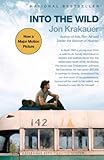 Into the Wild by Jon Krakauer
Into the Wild by Jon KrakauerAn intriguing and thought provoking read. This book is more than just a biography or epilogue on the life of Chris McCandless. The author does a great job of tracing the last 2 years of McCandless' life while also setting other examples of man vs. wild at counterpoint.
Writing Style
Krakauer has a fabulous eye for detail, a great vocabulary, and his writing shows an intense passion for the outdoors. The descriptions of places, people and events were so vivid and engrossing that I feel as though I have a personal familiarity with many of the locations and events portrayed in the novel.
Even though Krakauer obviously has some of his own opinions and thoughts about the events, he did a fairly good job of presenting the work without too much intrusion of authorial bias. Actually, I felt that having Krakauer as author and narrator actually brought more to the story through his personal insights and bias. If the story was truly told by an absolutely non-biased author or by an author less passionately involved in the wilderness, I believe a lot would have been lost.
I also really enjoyed the use of quotations at the beginning of each chapter. Some of the quotations were pulled from passages found with McCandless while others were likely researched and input by Krakauer to add emphasis to his narrative.
Voice & Narrative
Krakauer's narrative voice was subtle and accessible and provided an excellent unobtrusive narrator for the course of the book. His passion for the outdoors in general and for hiking in particular was evident, especially in the chapters he devoted to his own experience.
At first I was taken slightly aback at the author's biographical interruption with his own climbing experience. On one hand, it felt somewhat egoistical to place himself in the same category as the numerous other anecdotal stories he had cited. As I thought more about it, however, it felt perfectly natural that he include his own experience. Firstly because the experience was just as good a parallel as any of the other stories he had researched and shared. Secondly, because it did expose the authorial bias that Krakauer did have towards McCandless and explained exactly how it was that the author truly could and did relate to the subject.
The Story
While there may have been times that Krakauer imposed some bits of fiction into the biography, he tries hard to present all of his writing either as fact based on findings or research or as his own opinion and he is careful to identify passages that are his opinion rather than documented fact. In a story such as this, there are times when educated opinions are the best we can hope for, and I think Krakauer presents himself as a viable source for potentially valid opinions.
While the central focus of the story is the last two years of Chris McCandless' life, that is not entirely the heart of the message.
As I started reading, I didn't know much about McCandless other than that he hiked out into Alaska and was found dead a few months later. I'd read some Jack London in High School, but even then, I wasn't entirely sure how this story was going to become a full book. It was exciting to find that the book explored more than just his final days in Alaska. It provides a rich biography of a young man searching for something and having many exciting and interesting experiences along the way.
I enjoyed the biography of Chris' life. It's easy to look at him and call him a "whiner" and condemn him for not just accepting the "good life" that was handed to him on a silver platter. It's harder to pull back the layers and actually examine the motives that drove him to the behaviors and actions of his life and death. Krakauer does a good job of investigating his life thoroughly and exposing the impetus for his journeying.
Overall
I think the heart of the story was outlined towards the end of the book. At one point, Krakauer and some of his friends go to visit the bus where Chris was found. In that chapter and those around it, Krakauer explores the psyche and motivations of Chris McCandless.
To paraphrase my take-a-way, he seems to suggest that everyone has a desire for adventure, excitement and to conquer the unconquerable...to push ourselves to the limit and to find (and push beyond) the extent of our capabilities. Krakauer makes the point that as we mature into full adulthood, we tend to restrain the wreckless abandon of youth, but if we're honest with ourselves, we can look back to our youth and see our unbridled passions chomping at the bit for the next great adventure.
In the case of Chris McCandless (and numerous others described in the book), the adventurous spirit full of wanderlust and excitement was never restrained. And in the case of Chris, he took it beyond the teenage spirit of "fast driving", "raucous partying", or just plain "outrageous living." Chris McCandless pushed himself farther and harder because he had an insatiable desire to do so. Whether that is born of an innate desire to discover the greatness of the human soul or out of stifled inferiority complex in his life, we may never know and truly it doesn't matter.
While we shouldn't go out into the world and recklessly throw ourselves in the path of disaster, I think the heart of this book is telling us that we need to examine our behaviors and explore the limits we have imposed on ourselves. Some limits may truly exist for our safety and our own personal improvement. Others may simply exist because of fear and timidity. The latter should be tossed away so we can truly live.
***
3 stars
No comments:
Post a Comment